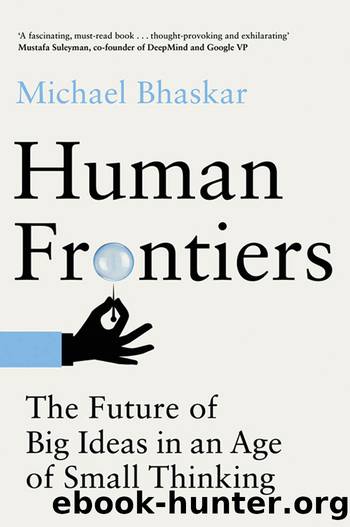Human Frontiers: The Future of Big Ideas in an Age of Small Thinking by Michael Bhaskar

Author:Michael Bhaskar [Bhaskar, Michael]
Language: eng
Format: epub
Tags: Future Studies, Social Science, social history, ideas; big ideas; technology; innovation; radical innovation; thinking; thought; 21st century; science; science of science; economics; economic growth theory; great stagnation; peer review; research incentives; AI; artificial intelligence; scientific discovery; synthetic biology; quantum computing; China; India; technologies of the future; social theory; intellectual history; futurism futurist; existential risk; paradigm shift; end of history; human rights; research productivity; scientific revolution; Einstein Newton; science and technology slowdown; nuclear fusion; convergence; managerialism; long term thinking; Fukuyama Wright Pasteur Maxwell; CRISPR gene editing; citations; apollo missions moonshots; industrial revolution; complexity; university; Nobel Prize; Bell Labs; laboratory; Edison; DeepMind; science and technology studies, history, Technology & Engineering
ISBN: 9780262046381
Google: QS9GEAAAQBAJ
Publisher: MIT Press
Published: 2021-11-02T00:25:49.863551+00:00
Another way of thinking about this is that we would need to add the equivalent of a nuclear power plant to the global grid every single day for the fifty years from 2000 to 2050. Renewables have become much cheaper, yes, but still coal use is way up in the new millennium. The revolution is on track, but at this rate we'll get there in 400 years.105 Nowhere is the demand that we step up and deliver big new ideas more urgent than in the matter of planetary survival. There are a number of ideas that could work. A massive carbon tax. Radical change in consumption patterns in everything from travel to diet. Huge investment and rollout in carbon capture and storage. New pushes in agriculture and forestry. Blue sky technologies from fusion to, potentially, geoengineering. There is so much scope: just a few hours of the sunlight that falls on Earth would give us more energy than we need today; 20 per cent of global wind capacity is seven times more than we need.106 We've already looked at fusion power. We can regear our approaches to land, agriculture and the food supply chain; transform our materials superstructure and manufacturing base. Create genuinely sustainable modes of living and consuming. Build carbon neutral or, better yet, negative technologies and economies.
In the face of all this, perhaps the ultimate problem is our inability to pursue collective action. Bound by the needs of companies or nations, we're hemmed in by a context of short-term financial interests; a parochial lack of vision; political and national tribes still looking out for their self-interest. The fundamental truth of global society is that the planet is burning and yet none of our efforts at the frontier have so far measured up. Exhibit A of our stagnant world is one incapable of rolling out ideas to save itself.
You might think that, for example, the founding of a new musical genre is far removed from the climate crisis. In one sense it is, but in another it's about dynamism, attitudes to trying and delivering new things at the frontier. Its absence is indicative of a deep complacency. Tyler Cowen has gathered much evidence of this: people don't move house but stay in the same jobs and social class, don't even leave the house as much as they used to.107 Segregation, matching, risk dodging: everyone works hard to avoid new and challenging cultures and experiences. Resistance to change has always been a feature of life, but after decades of greater openness, we have now reverted to type. A civilisation addicted to complacency is not one well disposed to meet the colossal challenges of its times.
These two chapters paint a grim story for the future of big ideas, suggesting a continuation or even an intensification of the trends described in Part I. J. Storrs Hall talks about ideas as an onrushing tide over a landscape.108 Occasionally it finds a new fertile valley and rushes to fill it. This is a time of paradigm shifts and phase transitions, of frontiers pushed back.
Download
This site does not store any files on its server. We only index and link to content provided by other sites. Please contact the content providers to delete copyright contents if any and email us, we'll remove relevant links or contents immediately.
| Automotive | Engineering |
| Transportation |
Machine Learning at Scale with H2O by Gregory Keys | David Whiting(4313)
Never by Ken Follett(3956)
Urban Outlaw by Magnus Walker(3395)
OPNsense Beginner to Professional by Julio Cesar Bueno de Camargo(3288)
Sapiens and Homo Deus by Yuval Noah Harari(3071)
Will by Will Smith(2919)
A Short History of Nearly Everything by Bryson Bill(2698)
Hooked: A Dark, Contemporary Romance (Never After Series) by Emily McIntire(2554)
Rationality by Steven Pinker(2363)
Borders by unknow(2313)
The Becoming by Nora Roberts(2201)
Holy Bible (NIV) by Zondervan(2125)
A Short History of War by Jeremy Black(1848)
HBR's 10 Must Reads 2022 by Harvard Business Review(1844)
The One Percenter Encyclopedia by Bill Hayes(1826)
Freedom by Sonny Barger(1800)
Go Tell the Bees That I Am Gone by Diana Gabaldon(1758)
A Game of Thrones (The Illustrated Edition) by George R. R. Martin(1744)
Five Ways to Fall by K.A. Tucker(1742)
